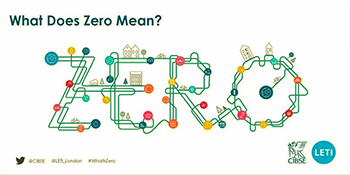What does zero mean

|
| What Does Zero Mean ? Launch of CIBSE-LETI FAQs. Online event. 7th April 2022 |
Contents |
[edit] Launch of new guidance on Net Zero Carbon definition
The Climate Change Committee (CCC) recommends a new target for the UK: net zero emissions by 2050. The target will deliver on the commitment that the UK made by signing the Paris Agreement. It is achievable with known technologies, alongside improvements in people’s lives, and within the expected economic cost that Parliament accepted when it legislated the existing 2050 target for an 80% reduction from 1990.
However, this is only possible if clear, stable, and well-designed policies to reduce emissions further are introduced across the economy without delay. Current policy is insufficient for even the existing targets. On 2 May 2019, the Committee published its advice to Government on a Net Zero target for the UK, read the full report here. This recommendation was followed by the government, and the UK adopted a legal target of Net Zero by 2050.
In June 2021, CIC launched its CIC Climate Action Plan. CIBSE is a signatory and very much supports it, having been very active in its creation. The plan includes significant steps which should deliver real progress towards Net Zero and climate adaptation, such as joint industry guidance, mandatory CPD and working with higher education institutions.
To deliver real progress on net zero, we need to develop a common understanding of what it means for buildings, in practice, and in detail. The Chartered Institution of Building Services Engineers (CIBSE) and London Energy Transformation Initiative (LETI) will be launching new guidance, developed to provide industry-wide definitions and address frequently asked questions during an online launch event on 7 April 2022.
This guidance, led by Julie Godefroy, Head of Sustainability for CIBSE and Clara Bagenal George, Associate at Elementa Consulting, builds on the definitions developed by WLCN/LETI in summer 2021 and looks at whole life, embodied – referring to total emissions and removals associated with an asset throughout the whole life cycle of an asset; upfront carbon – referring to emissions associated with materials and construction processes up to practical completion; operational energy; and operational water. Crucially these new definitions are based on meeting operational energy and embodied carbon targets and generating energy from renewable sources.
The new guidance from CIBSE and LETI provide more detail and are intended to be applied consistently in as many real-life situations are possible.
An initial industry survey on the FAQs illustrated that there was general agreement about acknowledging achievements in working towards net-zero operational energy at different project stages, with the provision that continued progress is verified on an annual basis. This guidance is for professionals from different disciplines, clients, investors, and occupants so they can be aligned in language and understanding of net-zero targets and achievements.
[edit] Find out more
With a growing suite of CIBSE guidance and digital tools relating to embodied carbon, net-zero and creating a circular economy practice, this exciting new resource further demonstrates the impact of industry collaboration and communication in responding to challenges presented by the climate emergency.
The launch event is online and free to attend. Attendees will be invited to participate in an interactive Q&A as part of an engaging afternoon session hosted by Clara Bagenal George, and Julie Godefroy.
Register for the launch event via www.eventbrite.co.uk/e/what-does-net-zero-mean-launch-of-cibse-leti-faqs-tickets-296832894177
Find out more about CIBSE’s ongoing work around net-zero via https://www.cibse.org/news-and-policy/policy/technical-themes/net-zero
[edit] About CIBSE
CIBSE publishes guidance providing best practice advice and is internationally recognised as authoritative design guidance for building services. The CIBSE Knowledge Portal, which makes guidance available online to all CIBSE members, is the leading systematic engineering resource for the building services sector.
For more information about the Institution, please visit www.cibse.org
[edit] About LETI
LETI is a network of built environment professionals that are working together to put the UK on the path to a zero-carbon future. In 2020, LETI launched the Climate Emergency Design Guide and the Embodied carbon primer, which outlines the requirements of new buildings to ensure our climate change targets are met. in 2021, LETI published guidance on Hydrogen, Carbon Alignment, a Client Guide for Net Zero Carbon Buildings, and the Climate Emergency Retrofit Guide.
--CIAT
This article first appeared on the CIAT website on March 31, 2022.
[edit] Related articles on Designing Buildings
- Absolute zero carbon.
- Architects Declare.
- Carbon negative.
- Carbon neutral.
- Carbon footprint.
- Carbon negative.
- Carbon neutral.
- CIBSE Case Study: Walgreens net-zero energy drugstore.
- Climate Change Act.
- Climate emergency.
- LETI publishes Climate Emergency Retrofit Guide.
- Low or zero-carbon technologies.
- Net zero carbon building.
- Net zero carbon.
- Nearly zero-energy building.
- Net-zero carbon 2050.
- Passivhaus.
- PH ribbon tool calculates embodied carbon of designs.
- Stagnation point.
- What we need for the journey to net-zero carbon emissions.
- Zero carbon homes.
- Zero carbon non-domestic buildings.
- Zero-carbon energy sources.
- Zero-carbon-ready building
- A zero-carbon UK by 2050?
- Zero Bills Home.
Featured articles and news
UKCW London to tackle sector’s most pressing issues
AI and skills development, ecology and the environment, policy and planning and more.
Managing building safety risks
Across an existing residential portfolio; a client's perspective.
ECA support for Gate Safe’s Safe School Gates Campaign.
Core construction skills explained
Preparing for a career in construction.
Retrofitting for resilience with the Leicester Resilience Hub
Community-serving facilities, enhanced as support and essential services for climate-related disruptions.
Some of the articles relating to water, here to browse. Any missing?
Recognisable Gothic characters, designed to dramatically spout water away from buildings.
A case study and a warning to would-be developers
Creating four dwellings... after half a century of doing this job, why, oh why, is it so difficult?
Reform of the fire engineering profession
Fire Engineers Advisory Panel: Authoritative Statement, reactions and next steps.
Restoration and renewal of the Palace of Westminster
A complex project of cultural significance from full decant to EMI, opportunities and a potential a way forward.
Apprenticeships and the responsibility we share
Perspectives from the CIOB President as National Apprentice Week comes to a close.
The first line of defence against rain, wind and snow.
Building Safety recap January, 2026
What we missed at the end of last year, and at the start of this...
National Apprenticeship Week 2026, 9-15 Feb
Shining a light on the positive impacts for businesses, their apprentices and the wider economy alike.
Applications and benefits of acoustic flooring
From commercial to retail.
From solid to sprung and ribbed to raised.
Strengthening industry collaboration in Hong Kong
Hong Kong Institute of Construction and The Chartered Institute of Building sign Memorandum of Understanding.
A detailed description from the experts at Cornish Lime.
























